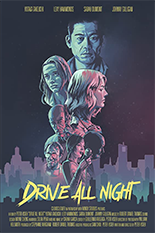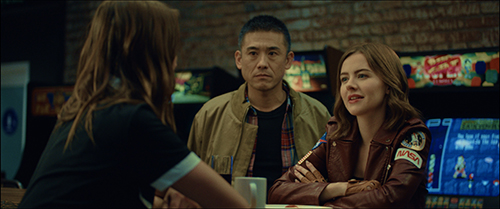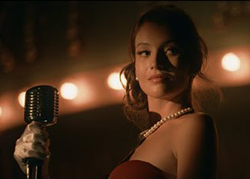
 In Drive All Night, cabbie Dave (Yutaka Takeuchi, Battleship) does just that. This taxi driver is no Taxi Driver wishing a real rain to come and wash all the scum off the streets; he’s smart and sweet — a Travis Butterbrickle, if you will.
In Drive All Night, cabbie Dave (Yutaka Takeuchi, Battleship) does just that. This taxi driver is no Taxi Driver wishing a real rain to come and wash all the scum off the streets; he’s smart and sweet — a Travis Butterbrickle, if you will.
His passenger for the entire evening is Cara (Lexy Hammonds, 2017’s Escape Room — not the famous one), a young and semi-bratty woman with reserves of Mortal Kombat II trivia, a “We All Die Someday” tattoo and a duffel bag — here called just “duffel,” which is more enigmatic than its unknown contents. As she makes Dave chauffeur her around town for hours and hours, from arcade and café to motel, she’s being followed by a big, bad, bald dude (Johnny Gilligan, Mega Shark vs. Giant Octopus) who looks ready to attend a Halloween party as Ryan Gosling in Drive.
Certainly that’s not accidental, as Peter Hsieh’s debut feature arrives gorgeously soaked in the neon-hellhole California ambience of Nicolas Winding Refn’s work (notably Only God Forgives and The Neon Demon) with accompanying mood for days — er, nights). Absorbing a director’s color palette is a relatively easy task, which Hsieh pulls off, no doubt with the help of feature-debuting DP William Hellmuth.

But to also attempt David Lynch-branded surrealism is a too-tall order, especially on one’s first try; just being weird and cryptic isn’t enough. For example, a mysterious torch singer named Midnight Judy (Natalia Berger) is rumored to be a vampire, but her inclusion assumedly seems only to serve a desire to pay homage to the Club Silencio sequence from Lynch’s masterpiece, Mullholland Drive. While Berger’s slinky appearance is sure to satisfy opera-glove fetishists, her dreamlike showcase is out of the filmmaker’s ambitious reach.
Or perhaps Midnight Judy’s purpose might be due to Drive All Night’s bones simply not bearing enough meat to merit a full-length movie. Veering from his strong suit of shot composition, Hsieh’s workarounds include box-turtle pacing and dosing each performance with Dramamine. The effect is like a napping actor waking mid-scene and suddenly realizing his or her line is up — or was:
 Cara: “I like you.”
Cara: “I like you.”
[7-second pause]
Dave: “I like you, too.”
Cara: “You afraid of dying?”
[13-second pause]
Dave: “I try not to think about it.”
One wonders if all that somniferous dead air were in Hsieh’s script. Takeuchi’s built-in affability survives this curious touch; the overall vibe does not.
Hammonds comes off too young to play her Manic Pixie Dream Fare with believability; switching roles with the more experienced Sarah Dumont (Scouts Guide to the Zombie Apocalypse) as a late-night waitress who catches Dave’s eye (and vice versa) would benefit both actresses and the simple story. Another would be to give more scenes for comic-relief cabbie Will Springhorn to steal with his amusing character’s sleazy braggadocio. Whenever Springhorn ambles in, which is not enough, he alights the screen; the rest of the film rarely works up such a spark — not for any considerable stretch and definitely not All Night. —Rod Lott
